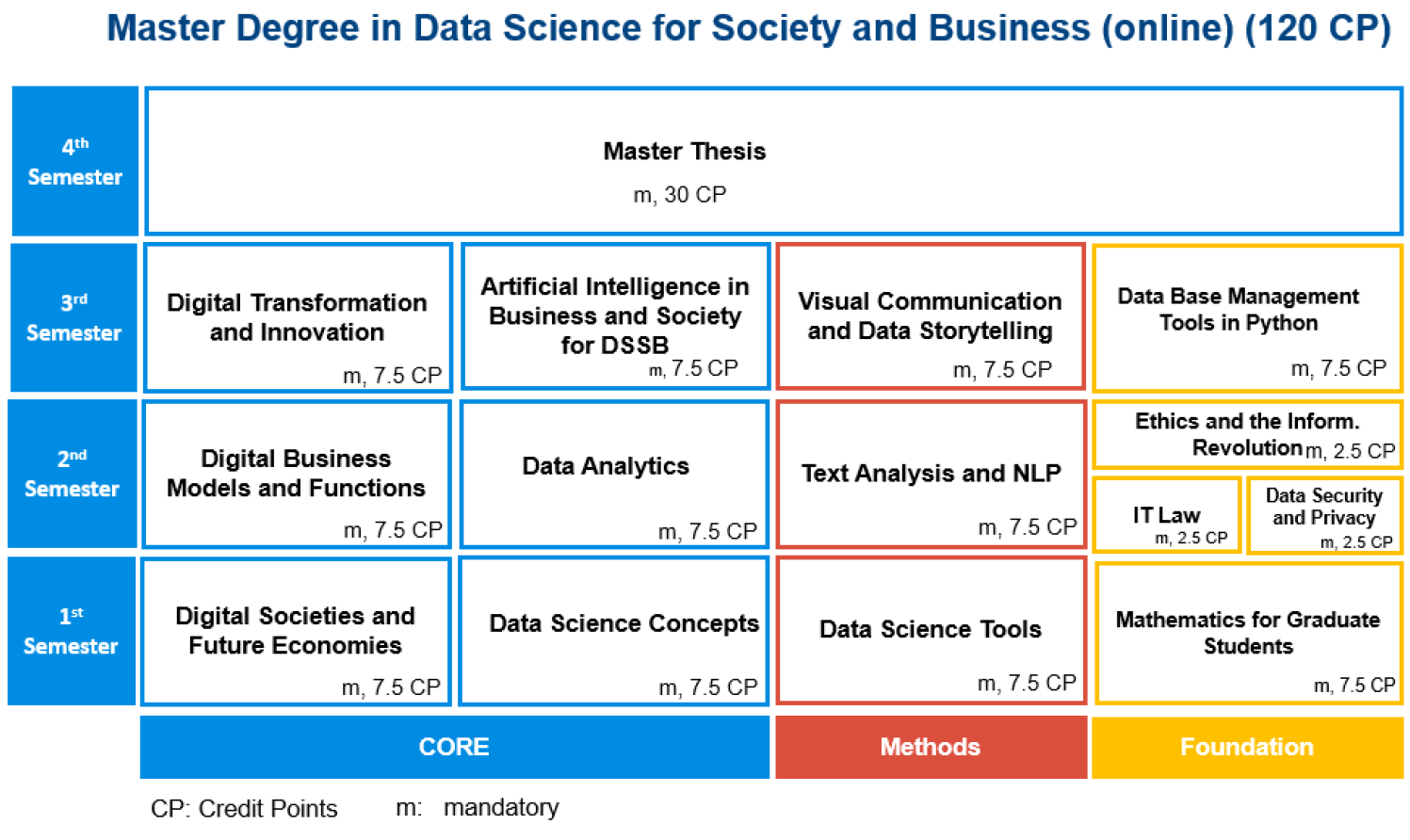

Data Science for Society and Business
Data Science for Society and Businessand receive a regular Master’s degree from a top-ranked private German University.
The aim of this 2-year Data Science for Society and Business (DSSB) (online) MSc program is two-fold. On the one hand, it aims to use rapidly growing digital data resources and new computational tools and methods to describe, model, predict, and potentially solve pressing business, ecological, economic, organizational, political, or other social problems and significant trends like innovation diffusion, migration flows, susceptibility to infections, sustainable growth, political mobilization, and the likes. On the other hand, the program addresses the rising demand for social data science expertise and critical skills in new industries (i.e., social media, start-ups), in established sectors (i.e., production, civil and private services), typical job specifications (i.e., consulting, market research, marketing), public administration (i.e., health, security), and academia (all sciences).
Degree and ECTS points: Master of Science, 120 ECTS

Digital innovations are rapidly conquering all areas of social and economic life. Today, modern societies can hardly function without social media, search engines, communication and e-commerce platforms, and individualized online offers. In less than a decade, these multi-purpose technologies have become the core components of an economy and other social sectors.
External shocks such as the COVID-19 pandemic have pushed digitalization toward another leap. Home-Office solutions, digital learning, online conferencing, telemedicine, cybersecurity and other digital services have become an essential part of our private, professional, and public life in no time. Meanwhile, we are permanently adding to the surging data stockpile gathered and harvested by the IT services.
Research institutions, private firms, public administration, political parties, NGOs and other—including criminal—actors are already using and will continue to use “big” data to better understand, predict, and effectively intervene in issues of crucial interest to contemporary and future societies.
Data may become the “new oil of the 21st century,” as predicted by British mathematician Clive Humby in 2006. The second part of his famous quote is already true: Data “is valuable, but if unrefined, it cannot really be used.”
Data science is currently one of the hottest fields in the job market, and combines concepts and techniques from various fields, in particular computer science and statistics. This module combines the mathematical and statistical foundations with the major algorithmic concepts of data science. The module introduces the fundamental principles of linear algebra for data analysis and gives special attention to dimension reduction techniques and other data projection algorithms. It covers the fundamental probability concepts needed for assessing and evaluating modeling results and predictions, and proceeds to discuss complexity issues for data science projects.
The second part of the module overviews supervised and unsupervised learning techniques. This module aims at providing the fundamental knowledge in mathematics and statistics necessary for understanding the practical application of data science algorithms and evaluating their performance. It also provides an overview of the fundamental concepts along with the main questions and approaches in data science. Students will learn how to address societal and business-related issues based on practically relevant questions, digital data, and their learned programming and analytical skills from synchronized methods modules.
At the end of the 2-year online program, students will have acquired a strong body of expertise, both in content and in computational skills, to solve challenging problems in digital societies thoughtfully and responsibly.
The DSSB (online) MSc program is composed of foundational lectures, specialized modules, tutorials, and asynchronous activities. These lead to a master thesis that can be conducted in close collaboration with research, institutional, or industry partners. The program takes four semesters (two years). The following table provides an overview of the program’s modular structure.
The program is partitioned into three areas (core, methods and foundation) and the master thesis. All credit points (CP) are based on ECTS. Students need to obtain a total of 120 CP to graduate. The default module size is 7.5 CP, with smaller 2.5 CP modules being possible as justified exceptions, e.g., if the learning goals are more suitable for 2.5 CP and the overall student workload is balanced.

All study programs at Constructor University are accredited by the German Accreditation Council, guaranteeing adherence to high academic quality and international standards. This accreditation confirms that each program meets formal and subject-related criteria in terms of content, structure, and intended learning outcomes.

Constructor University online study programs focus on the holistic learning success of students and offer a variety of synchronous and asynchronous formats that align with problem- and project-based learning.
The online master program in DSSB applies proven and effective teaching and learning modalities that engage distance learners and support a vibrant learning community. This means that students participate in online courses with predominantly asynchronous lectures and learning activities that are complemented by synchronous tutorials and hands-on sessions.
Students are guided and supported by faculty as well as experienced tutors and lecturers to transfer acquired knowledge into practice. The hands-on elements include dedicated collaboration with other students using tools and concepts that enable distributed work from different places and different time-zones.
Students enrolled in online study programs will find their course materials such as videos, case studies, scholarly articles, websites, podcasts, online games etc. on a Learning Management Software (LMS) platform provided by Constructor University.
Yes. The online Master's and Bachelor's programs are regular university programs. The only difference is the teaching mode.
This degree gives you access to the German Job Market. After graduation, you can apply for a 6-month job search visa, once you find a job, you can be granted a residence permit. You do have similar access in terms to access to the market as German citizens (for as long as you are paid a fair wage, you are entitled to work permit).
Constructor University awards Bachelor degrees which have for almost 20 years been recognized across the world by graduate schools and employers. However, since international students are not studying in person in Germany/Europe and do not have the same visa/residence permit status, extra efforts need to be undertaken to get access to the German/European job market, e.g., by looking for internship placements in these regions. Constructor University can provide support with potential internship offerings. Online students can also use the advantage of studying and engage in work or internships in their own home countries.
The online Master's and Bachelor's programs are regular university programs. The diploma is awarded in the same manner and it does not state the mode of teaching. Upon graduation, the student is awarded three different documents: Diploma, Diploma Supplement, and Transcript. The Diploma and Transcript do not mention the mode of teaching, the Diploma Supplement does.
Because the program is taught online and does not require on-campus presence, the issuing of visa to reside in Germany in the course of their studies cannot be guaranteed. However, if there are no visa limitations, you are free to reside also in Bremen to complete your online studies. Residence would then be off-campus. Upon request, Constructor University can support you in finding off-campus accommodation.
You will be invited to join the Graduation Ceremony but you need to arrange and pay for your travel. If you participate in the Graduation Ceremony and fulfill the graduation requirements by the deadline set by Student Registrar Services, you will receive the diploma awarded at the graduation ceremony. The diploma and diploma supplement are always issued later and sent to you.
And if you cannot participate in the graduation ceremony, the documents will be sent to you in physical form by mail.
You will be invited to join the Graduation Ceremony but you need to arrange and pay for your travel. If you participate in the Graduation Ceremony and fulfill the graduation requirements by the deadline set by Student Registrar Services, you will receive the diploma awarded at the graduation ceremony. The diploma and diploma supplement are always issued later and sent to you.
And if you cannot participate in the graduation ceremony, the documents will be sent to you in physical form by mail.
There is no financing option for this program (scholarships, tuition deferral program and need-based aid are not applicable to this online program).
Data scientists with a focus on business and social sciences face manifold career options. The demand for their expertise is significant and growing. They can work not only in tech and for social or consulting firms but also for NGOs and international organizations; in retail, e-commerce, and telecommunication; in the finance sector; in the automotive and health industries; for public administration; and in academia. Companies and institutions in almost every domain need:
- data scientists, “big data” scientists, artificial intelligence (AI) research scientistsbusiness intelligence analysts, computational social scientists, consultants, data analysts, data management experts, data protection specialists, financial analysts, managers, market researchers, marketing managers, medical data analysts, public affairs consultants, scientific advisors, social media analysts, web analysts, etc. Graduates of the DSSB program can work in these roles.
- experts in data analysis who (critically) evaluate, analyze, and interpret the collected digital data accurately and can visualize the findings clearly are also needed in public relations, journalism, political think tanks, government, police departments, and international organizations such as the World Bank, WHO, EU, UN, etc.
- experts in digital data acquisition, who can instantaneously collect the relevant data, working in all sectors of an industry
- experts in data management who know how to store, enhance, protect, and process large amounts of data efficiently work as an information security analyst, database manager, project manager, or in similar roles
- an MSc degree in DSSB also allows students to move on to a PhD and a career in academia and research institutions
The employability of DSSB graduates is promoted by sharing contacts with industry, public institutions, non-governmental organizations, and research institutes throughout the curriculum. In the fourth semester, participation in additional public big data challenges is organized as an elective in the curriculum.

The DSSB (online) graduate program is a highly selective program for students of all age groups with a strong background in the social sciences, such as anthropology, business, economics, demography, management science, media science, political science, psychology, social history, or sociology, who want to become a data scientist and are interested in business and social science research questions.
However, we are also open to ambitious learners from humanities such as history or linguistics, natural sciences such as cognitive or health sciences, or other areas with a quantitative orientation. Students must be interested in working in interdisciplinary, international, and innovative research fields. The program prepares for a professional and academic career.
Admission to Constructor University is selective and based on a candidate’s university achievements, recommendations, and self-presentation. Students admitted to Constructor University demonstrate exceptional academic achievements, intellectual creativity, and the desire and motivation to make a difference in the world.
The following documents need to be submitted with the application:
- Letter of motivation
- Curriculum vitae (CV)
- Official or certified copies of university transcripts
- Bachelor’s degree certificate or equivalent
- Language proficiency test results (minimum score of 90 (TOEFL), 6.5 (IELTS) or 110 (Duolingo)).
- Copy of Passport
- Letter of recommendation (optional)
This study program is part of the School of Business, Social & Decision Sciences.
The School of Business, Social and Decision Sciences focuses on interdisciplinary research and education in business sciences, economics and finance, logistics, psychology, political sciences, and sociology.

Students are guided through their studies via the state-of-the-art Learning Management System (LMS) provided by Constructor, leveraging an active approach to knowledge discovery.
Tutors and lecturers support our students in their learning through virtual study groups, peer evaluation, and mentoring. This is an online program with optional blended elements such as internships at our partner institutions to gain professional experience.

Call us or write us – we are happy to help you with your inquiry.
Muhammed Hageg
Recruitment Counselor Online Program
Email: onlineprogram@constructor.university
Phone: +491622013305

